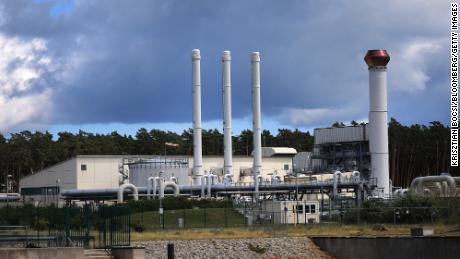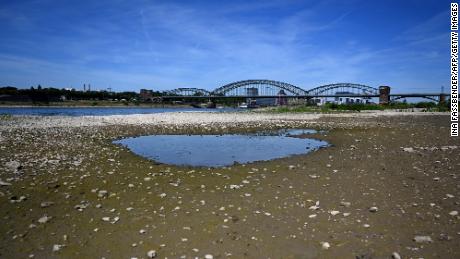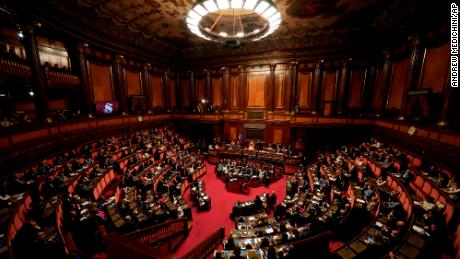Economists are warning that a recession late this year or early next year looks increasingly possible as risks pile up.
“We are not in good shape,” said Erik Nielsen, group chief economics adviser at the Italian bank UniCredit. “I think the odds are we will have a recession in Europe over the winter.”
The biggest concern surrounding Europe’s economy is access to energy. Fears have spiked that
Moscow could shut off gas supplies to retaliate for tough sanctions following the invasion of Ukraine, delivering the bloc a massive shock.
The International Monetary Fund has
said that if gas from Russia were to stop flowing, vulnerable countries including Slovakia, the Czech Republic and Hungary could fall into a severe recession, taking a GDP hit as high as 6%. Germany’s top forecasters have said Europe’s biggest economy would
lose €220 billion ($225 billion) over the next two years.
Already, 12 EU member states have had gas supplies from Russia entirely or partially cut off, according to the European Commission, which
unveiled its emergency plan to conserve gas for next winter on Wednesday. The flow of Russian gas to Europe is less than one-third of what it was this time last year, the Commission said.
A crucial moment in the standoff looms. Anxiety has climbed since Russian gas giant Gazprom shut down the Nord Stream 1 pipeline for scheduled maintenance 10 days ago, sending European gas prices to their highest level since March. Flows via the pipeline are essential, and have historically met an estimated 12% of EU demand, according to S&P Global Platts.
Gazprom is supposed to restart operations on Thursday. But
officials have expressed doubts about whether the pipeline will come back online at all — and if so, how much gas will shipped through it.
“It is impossible for us to predict how Gazprom is going to act,” an EU spokesperson told CNN on Tuesday.
Nord Stream 1 volumes to Germany already dropped sharply before maintenance began. They plunged by 60% last month, forcing Berlin to declare a “gas crisis.”
On Tuesday, Russian President Vladimir Putin said that Gazprom would “fulfill all of its obligations,” though he warned that a dispute over vital turbines, which had been caught up in sanctions, jeopardized supply.
Even if flows do resume without incident, the specter of future throttling will hang over Europe, holding back investment and confidence.
“What we will be getting is a longer period of uncertainty, which is not going to be good for the business cycle,” said Guillaume Menuet, Citi Private Bank’s head of investment strategy and economics in Europe, the Middle East and Africa.
Inflation
Annual inflation in the European Union jumped to 9.6% in June. It reached 8.6% for the 19 countries that use the euro.
To cap price increases, the European Central Bank is due to start raising interest rates on Thursday for the
first time since 2011. But it faces an uphill battle to get the situation under control.
The central bank lags peers like the Federal Reserve, which started hiking months ago. Interest rates in Europe have been negative since 2014, which means it’s further behind. And, if a shortage of energy tips the region into recession, the central bank could be forced to abruptly stop hiking rates, hampering its ability to keep fighting inflation.
“Everything that’s happening right now is limiting the scope for the ECB to really hike a lot,” said Carsten Brzeski, global head of macro at ING, a Dutch bank.
Should a recession arrive, inflation could ease without requiring much further intervention from the central bank. But economists are hardly rooting for that outcome, which would also usher in a wave of job losses.
Climate change
Wildfires
tearing across Spain and France as a heatwave grips the region could also put a damper on economic activity.
Nearly half of Europe’s territory, including the United Kingdom, is “at risk” of drought, researchers at the EU Commission said Monday.
Germany, meanwhile, is grappling with a drop in water levels along Rhine river, a major trade artery. There are already signs that shipping has been affected.
“Low water levels mean that river barges will have to travel with reduced freight to limit their draft or even cease operating altogether,” Berenberg Bank said in a research note published Wednesday. “As a result, quantities shipped decrease and freight rates rise.”
That could weigh on Germany’s hugely important manufacturing sector. Researchers at the Kiel Institute for the World Economy found that in a month with 30 days of low water, the country’s industrial output
fell by about 1%.
Political turmoil
Meanwhile, a high-stakes political drama is playing out in Italy, the third largest economy in the European Union.
Prime Minister Mario Draghi is trying to hang on to power
after his governing coalition crumbled last week. He asked lawmakers on Wednesday to support the national unity government in a bid to avoid an early election.
Draghi, who used to lead the ECB and is a favorite among investors, attempted to resign after the 5-Star movement — the largest party in the country’s coalition government — withdrew its support, claiming Draghi’s package to address the rising cost of living didn’t go far enough.
Should Italian leaders be forced to call an early election, investors fear that right-wingers in the country could grow their support, raising questions about European cohesion at a tenuous juncture.
“If you now look ahead — especially for growth and for the economy — political developments are clearly a risk,” Brzeski said. After French elections in the spring, this was supposed to be a year of relative political stability, he added.
Investors have dumped Italian bonds as they monitor the situation, driving up yields. This raises the stakes even higher for the ECB, which is expected Thursday to unveil a new tool that would address dangerous fragmentation in the bond market. The fear is that if bond yields in Italy or other highly indebted countries like Greece leap too high, financial conditions would rapidly deteriorate.
Risk of recession
An economic forecast the European Commission released last week projected that the EU economy will grow by 2.7% in 2022 and by 1.5% in 2023. Annual average inflation is poised to touch a record high of 8.3% this year before falling to 4.6%.
A recession isn’t a given, according to Sylvain Broyer, the chief economist for Europe, the Middle East and Africa at S&P Global Ratings. Household finances remain strong and public investment is on the rise, he noted in a recent research note.
This summer is also expected to yield a busy travel season despite chaos at airports, propping up economic activity.
Broyer said that while “a sharp downturn in growth is 100% sure,” the chances of a “full-fledged recession” are smaller — somewhere between 30% to 43%, per his estimate.
Still, the odds are growing. A survey of European fund managers by Bank of America published this week found that 86% of respondents expect a recession over the next year, up from 54% in June.



























